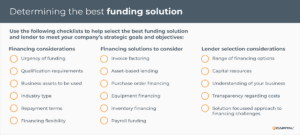SMBs play a pivotal role in driving economic growth, job creation, and innovation, yet they often face obstacles in accessing the capital necessary for expansion and innovation. Established business owners can attest that traditional bank loans aren’t suited for every type of business, nor are they attainable for most SMBs. Further, Small Business Administration (SBA) business loans are a financial solution only available to a small fraction of the businesses that apply. For undercapitalized SMBs, the solution for viable business financing lies in exploring alternative funding solutions.
Non-bank lenders are filling the credit gap created by traditional banks as they continue to exit middle market lending. These lenders provide accessible avenues for capital acquisition based on the company’s asset strengths, such as a strong accounts receivable, robust inventory levels, or valuable working equipment.
With the majority of businesses looking for funding in the next year to facilitate growth, your understanding of alternative funding solutions is an important step in choosing the best financial arrangement for your business needs. This article explores the difference between traditional bank loans vs alternative funding solutions offered by non-bank lenders. Keep reading to learn of the various alternative funding solutions available to SMBs and which option is best suited for your company.
Traditional Bank Loans vs. Alternative Funding Solutions
Traditional bank loans are the most known financial solution for business funding. The advantage of a bank loan or SBA loan is the minimized cost to the businesses that can qualify for them and who need a financial solution for cash flow difficulties, or a large cash sum to expand or to take advantage of purchasing opportunities.
However, bank loans typically offer the lowest cost for capital but have the most restrictive accessibility. Qualification normally requires extensive lead time for the bank to perform its due diligence, often resulting in a denied application. Further, loans must be repaid over an agreed-to term, creating a regular payment liability. SBA loans are restricted by several guidelines that could include a business’s age and industry and some types of loans require a down payment, reducing or eliminating access to this source of traditional funding for many companies.
Fortunately, alternative funding solutions are a much different experience for entrepreneurs providing a more flexible financial solution than traditional funding. It is available to a wider selection of business ages and sizes than most traditional bank funding and can be an ideal solution for startups or businesses with an immediate need for cash.
Alternative funding solutions come in many forms including the following:
Invoice factoring: This popular alternative funding solution leverages a company’s unpaid invoices. It provides advanced payment on accounts receivable to accelerate cash flow and provide immediate access to working capital. While there are some nominal administrative fees, there is no recurring payment liability as found with bank loan terms, and no debt is incurred.
Purchase order financing: Having a client order in-hand is a valuable asset for growing startups or businesses expanding with limited capital. Purchase order financing leverages the value of formal sales agreements to secure the funding needed to fulfill large orders and take on new opportunities despite the business having limited cash flow.
Inventory financing: This alternative funding solution uses inventory as collateral for business financing. Leveraging the dormant value of stock items, this creative funding option aids businesses in purchasing inventory, maintaining operations, or supporting growth without depleting cash reserves.
Asset-based lending: Businesses with significant investments in machinery, equipment, or real estate, have aging accounts receivable, or in some cases intellectual property, can leverage the value of these assets to secure financing. This flexible alternative funding solution can be used for expansion, upgrades, to finance seasonality or during unexpected volatility.
Payroll funding: This specialized alternative funding solution is a specific form of invoice factoring, and, or asset-based lending, involving the leveraging of accounts receivable to receive immediate cash. This financing method is tailored to assist staffing companies in meeting payroll obligations before receiving payment from clients.
Which Alternative Funding Solution is Best for My Business?
Every business has different needs. SMBs should assess their specific financial needs, business model, and growth objectives to determine the best alternative funding solution for their company. Factors to consider include the urgency of funding, creditworthiness, industry type, repayment terms, and what business assets can be leveraged. Comparing various alternative funding solutions like factoring, Purchase Order financing, or equipment financing can help identify the most suitable option for your company’s unique needs. Additionally, consulting with financial advisors or specialists in alternative funding solutions can provide valuable insights tailored to the SMB’s circumstances.
Selecting the right alternative lending partner
It is important to have a funding partner before financing is required so that a decision is never rushed or entered into without full consideration.
When selecting the right alternative lending partner, it’s crucial to consider their range of financing options, capital resources, understanding of your business, and transparency regarding costs.
A reputable lender should offer various financing solutions, possess sufficient financial backing, demonstrate knowledge of your industry, and maintain transparency in their dealings. The right partnership can enhance efficiency and address cash flow challenges effectively.
When selecting the right alternative lender for your SMB, choose the industry leaders with experience. These are the lenders who recognizing the unique financial characteristics, growth potential, and industry-specific nuances of your business and posses a solution focused approach to the financial obstacles that challenge your industry.
With a clear understanding of your business model and the industry challenges you face these lenders have developed the tools and practices to streamline funding throughout the various stages of business development and economic cycles. Whether your SMB is stretching to support growth, or struggling to overcome financial stress, leading alternative lenders provide fast flexible alternative funding solutions to overcome obstacles and deliver reliable financing you can count on.
Conclusion
SMBs face financial challenges accessing capital for growth and innovation, with traditional bank loans often being inaccessible. Alternative funding solutions, like invoice factoring, purchase order financing, inventory financing, and asset-based lending, offer flexible options. Selecting the right solution involves assessing financial needs, business model, and assets.
Choosing the right lending partner involves considering the lender’s financing options, capital resources, understanding of your business, and transparency in costs, with reputable lenders offering tailored solutions for SMBs’ unique circumstances.
To learn about our creative alternative funding solutions to meet your SMB’s unique financing needs, contact us today.
Key Takeaways
- Traditional bank loans aren’t suited for every type of business, nor are they attainable for most SMBs.
- Non-bank lenders are filling the credit gap created by traditional banks as they continue to exit middle market lending.
- Alternative funding solutions are available to a wider selection of business and provide a more flexible financial solution than traditional funding.
- When selecting the right alternative lender for your SMB, choose the industry leaders with experience. These are the lenders who recognizing the unique financial characteristics, growth potential, and industry-specific nuances of your business.
ABOUT eCapital
At eCapital, we accelerate business growth by delivering fast, flexible access to capital through cutting-edge technology and deep industry insight.
Across North America and the U.K., we’ve redefined how small and medium-sized businesses access funding—eliminating friction, speeding approvals, and empowering clients with access to the capital they need to move forward. With the capacity to fund facilities from $5 million to $250 million, we support a wide range of business needs at every stage.
With a powerful blend of innovation, scalability, and personalized service, we’re not just a funding provider, we’re a strategic partner built for what’s next.





